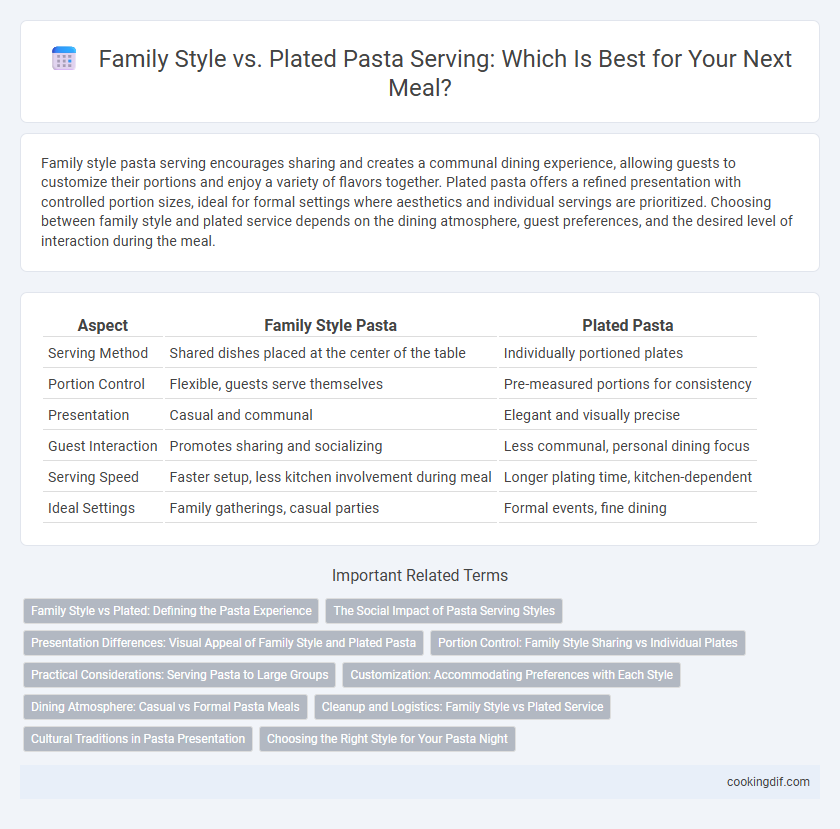Family style pasta serving encourages sharing and creates a communal dining experience, allowing guests to customize their portions and enjoy a variety of flavors together. Plated pasta offers a refined presentation with controlled portion sizes, ideal for formal settings where aesthetics and individual servings are prioritized. Choosing between family style and plated service depends on the dining atmosphere, guest preferences, and the desired level of interaction during the meal.
Table of Comparison
| Aspect | Family Style Pasta | Plated Pasta |
|---|---|---|
| Serving Method | Shared dishes placed at the center of the table | Individually portioned plates |
| Portion Control | Flexible, guests serve themselves | Pre-measured portions for consistency |
| Presentation | Casual and communal | Elegant and visually precise |
| Guest Interaction | Promotes sharing and socializing | Less communal, personal dining focus |
| Serving Speed | Faster setup, less kitchen involvement during meal | Longer plating time, kitchen-dependent |
| Ideal Settings | Family gatherings, casual parties | Formal events, fine dining |
Family Style vs Plated: Defining the Pasta Experience
Family style pasta serving encourages sharing and interaction, allowing diners to customize portions and mix flavors at the table, enhancing communal dining. Plated pasta offers precise presentation and controlled portion sizes, emphasizing individual enjoyment and refined aesthetics. The choice between family style and plated service shapes the overall pasta experience by balancing intimacy and personalization against elegance and structure.
The Social Impact of Pasta Serving Styles
Family-style pasta serving fosters communal dining experiences, encouraging sharing and conversation that strengthen social bonds among participants. Plated pasta servings, while providing controlled portions and aesthetic presentation, tend to create a more individual-focused meal that may limit interaction. The choice between family-style and plated pasta significantly influences the social dynamics and atmosphere of shared meals.
Presentation Differences: Visual Appeal of Family Style and Plated Pasta
Family-style pasta serving showcases large, vibrant bowls or platters filled with richly sauced noodles, encouraging communal dining and a warm, inviting atmosphere. Plated pasta emphasizes meticulous presentation, with carefully twirled portions, garnishes like fresh basil or Parmesan shavings, and precise sauce placement to enhance visual elegance. The family-style approach highlights abundance and casual comfort, while plated pasta focuses on refined aesthetics and individual experience.
Portion Control: Family Style Sharing vs Individual Plates
Family style pasta serving encourages communal dining but can lead to inconsistent portion control as individuals serve themselves varying amounts. Individual plated servings provide precise portion sizes, ensuring balanced calorie intake and consistent nutritional values. For dietary management and avoiding food waste, individually plated pasta is the optimal choice.
Practical Considerations: Serving Pasta to Large Groups
Serving pasta family style allows guests to customize their portions, reducing food waste and accommodating varying appetites, which is practical for large groups. Large bowls or platters enable efficient distribution and minimize the need for multiple trips to the kitchen. In contrast, plated servings offer precise portion control and elegant presentation but require more time and staff for serving, making them less practical for big gatherings.
Customization: Accommodating Preferences with Each Style
Family style pasta serving allows guests to customize portions and select preferred ingredients from shared dishes, fostering a communal dining experience with varied choices. Plated pasta presentations offer precise customization through individually tailored servings, accommodating dietary restrictions and specific flavor preferences for each guest. Both styles enhance personalization, with family style emphasizing interactive sharing and plated focusing on individualized culinary expression.
Dining Atmosphere: Casual vs Formal Pasta Meals
Family-style pasta serving fosters a casual dining atmosphere, encouraging sharing and lively interaction around the table, perfect for relaxed gatherings. Plated pasta meals create a more formal ambiance, with individually portioned dishes emphasizing presentation and elegance. This distinction influences the overall dining experience, balancing comfort against sophistication.
Cleanup and Logistics: Family Style vs Plated Service
Family style pasta service minimizes the need for multiple individual plates, reducing dishwashing time and easing cleanup logistics, especially for large gatherings. Plated pasta service requires more precise coordination and increases the number of used dishes and utensils, complicating both service flow and post-meal cleanup. Selecting family style over plated can streamline kitchen operations and lower labor costs related to dish handling and sanitation.
Cultural Traditions in Pasta Presentation
In Italian culinary traditions, family-style pasta serving fosters communal dining by placing large bowls of pasta at the center of the table, encouraging shared enjoyment and conversation. Plated pasta presentations emphasize individual portions, highlighting artistry and precise presentation valued in formal dining settings. These cultural practices reflect regional preferences, where rustic southern Italian meals favor family-style serving, while northern regions often prefer refined plated presentations.
Choosing the Right Style for Your Pasta Night
Family style pasta serving encourages sharing and creates a warm, communal dining atmosphere, enhancing the overall experience for gatherings. Plated pasta offers a refined presentation and precise portion control, ideal for formal dinners or when showcasing intricate sauces and garnishes. Selecting between family style and plated depends on the occasion, guest preferences, and desired ambiance to ensure a memorable pasta night.
family style vs plated for pasta serving Infographic

 cookingdif.com
cookingdif.com